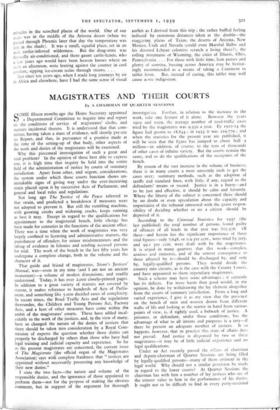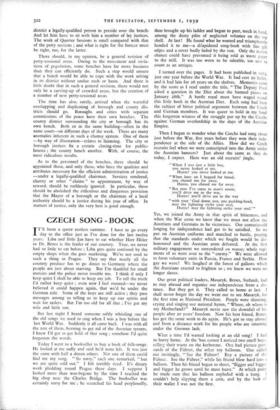MAGISTRATES AND THEIR COURTS
By A CHAIRMAN OF QUARTER SESSIONS
SOME fifteen months ago the Home Secretary appointed a Departmental Committee to inquire into and report on the conditions of service of magistrates' clerks, and matters incidental thereto. It is understood that that com- mittee, having taken a mass of evidence, will shortly present its Report, and that, in pursuance of a promise made at the time of the setting-up of that body, other aspects of the work and duties of the magistrates will be examined.
Why this piecemeal investigation of such a great and vital problem? In the opinion of those best able to express one, it is high time that inquiry be held into the entire field of the administration of justice by courts of summary Jurisdiction. Apart from other, and urgent, considerations, the system under which those courts function shows un- mistakable signs of giving way under the ever-increasing strain placed upon it by successive Acts of Parliament, and general and local rules and regulations.
Not long ago The justice of the Peace referred to that strain, and predicted a breakdown if measures were not adopted to prevent it. But still the rumbling machine, with growing creaks and widening cracks, keeps running as best it may. Except in regard to the qualifications for appointment to the magisterial bench, little change has been made for centuries in the functions of the ancient office. There was a time when the work of magistrates was very largely confined to licensing and administrative matters, the punishment of offenders for minor misdemeanours and the taking of evidence in felonies and sending accused persons for trial. The work of the bench in the last fifty years has undergone a complete change, both in the volume and the character of it.
That guide and friend of magistrates, Stone's justices' Manual, was—even in my time (and I am not an ancient monument)—a volume of modest dimensions, and readily understood. Today, it has over a,000 closely-printed pages. In addition to a great variety of matters not covered by statute, it makes reference to hundreds of Acts of Parlia- ment, and something like 5,000 decided cases of complexity. In recent times, the Road Traffic Acts and the regulations thereunder, the Children and Young Persons Act, Factory Acts, and a host of other measures have come within the ambit of the magistrates' courts. These have added incal- culably to the work of the justices, and, in the view of many, have so changed the nature of the duties of justices that there should be taken into consideration by a Royal Com- mission of experts the question whether those duties can properly be discharged by others than those who have had legal training and judicial capacity and experience. So far as the present magistrates are concerned, the current issue of The Magistrate (the official organ of the Magistrates Association) says with complete frankness that " justices. are appointed without necessarily possessing any knowledge of their new duties."
I state the two facts—the nature and volume of the responsible duties, and the ignorance of those appointed to perform them—not for the purpose of making the obvious comment, but in support of the argument for thorough investigat;oa. Further, in relation to the increase in the work, take one feature of it alone. Between the years 1905 and 1909, the average number of road-traffic cases tried by the magistrates was 9.330 a year. By 1910-14 the figure had grown to 18,844 ; in 1933 it was 219,779 ; and when the statistics for the present year are published, it will be seen that the figure has jumped to about half a million—in addition, of course, to the tens of thousands of other cases of infinite variety. But the courts remain the same, and so do the qualifications of the occupants of the bench.
By reason of the vast increase in the volume of business, there is in many courts a most unseemly rush to get the cases over; summary methods, such as the adoption of tariffs and standard fines, with little, if any, regard to the defendants' means or record. Justice is in a hurry—and to be just and effective, it should be calm and leisurely. Where the liberty of the subject is concerned there should be no doubt or even speculation about the capacity and impartiality of the tribunal entrusted with the grave respon- sibility of deciding whether or no a citizen should be deprived of it.
According to the Criminal Statistics for 1937 (the last published) the total number of persons found guilty of offences of all kinds in that year was 805,336. Of these—and herein lies the significant importance of those vital figures—only 7,648, or 0.9 per cent., were tried by jury, and 99.1 per cent. were dealt with by the magistrates. It is urged in many quarters that this work—complex, anxious and immense, and of the utmost consequence to those affected by it—should be discharged by, and only by, legally-qualified persons. They would divide the country into circuits, as is the case with the County Courts, and have appointed to them stipendiary magistrates.
Such a scheme may have some advantages ; it certainly has its defects. Far more harm than good would, in my opinion, be done by withdrawing the lay element altogether from the courts of summary jurisdiction. From a long and varied experience, I give it as my view that the presence on the bench of men and women drawn from different walks of life and looking at the matter in hand from various points of view, is, if rightly used, a bulwark of justice. A prisoner, or defendant, under those conditions, has the advantage of what to all intents and purposes is a jury—if there be present an adequate number of justices. It so happens, however, that in practice this state of affairs does not prevail. And justice is dispensed by two or three magistrates—it may be of little judicial experience and no legal qualifications.
Under an Act recently passed the offices of chairman and deputy-chairman of Quarter Sessions are being filled by legally-qualified persons—many of them eminent in the legal world. Why should not a similar provision be made in regard to the lower courts? At Quarter Sessions the chairman has with him a number of lay justices who are of the utmost value to him in the performance of his duties. It ought not to be difficult to find in every petty-sessional district a legally-qualified person to preside over the bench: And let him have to sit with him a number of lay justices. The work of Quarter Sessions is small compared with that of the petty sessions ; and what is right for the former must be right, too, for the latter.
There should, in my opinion, be a general revision of petty-sessional areas. Owing to the movement and varia- tions of population, some benches have far more business than they can efficiently do. Such a step would ensure that a bench would be able to cope with the work arising in its district without undue rush or haste. And there is little doubt that in such a general revision, there would not only be a carving-up of crowded areas, but the creation of a number of new petty-sessional areas.
The time has also, surely, arrived when the wasteful overlapping and duplicating of borough and county dis- tricts should go. Boroughs and cities with separate commissions of the peace have their own benches. The county district surrounding the city or borough has its own bench. Both sit in the same building—often in the same court—on different days of the week. There are many anomalies inherent in such a clumsy system. One of them —by way of illustration—relates to licensing. The city or borough justices fix a certain closing-time for public- houses ; the county bench another. With, of course, the most ridiculous results.
As to the personnel of the benches, there should be appointed those, and only those, who have the qualities and attributes necessary for the efficient administration of justice —under a legally-qualified chairman. Services rendered, charity or other " claims " to appointment, by way of reward, should be ruthlessly ignored. In particular, there should be abolished the ridiculous and dangerous provision that the Mayor of a borough or the chairman of a local authority should be a justice during his year of office. In matters of justice, only the very best is good enough.



































 Previous page
Previous page